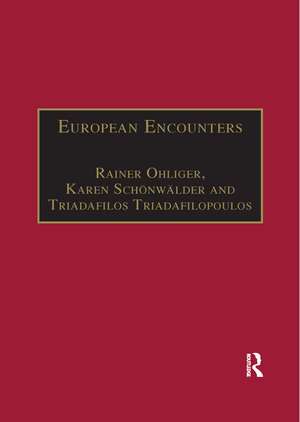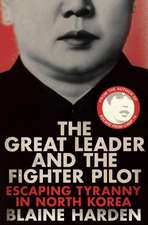European Encounters: Migrants, Migration and European Societies Since 1945: Research in Migration and Ethnic Relations Series
Autor Rainer Ohliger, Karen Schönwälderen Limba Engleză Paperback – 30 iun 2020
| Toate formatele și edițiile | Preț | Express |
|---|---|---|
| Paperback (1) | 319.01 lei 3-5 săpt. | +22.67 lei 10-14 zile |
| Taylor & Francis – 30 iun 2020 | 319.01 lei 3-5 săpt. | +22.67 lei 10-14 zile |
| Hardback (1) | 770.09 lei 6-8 săpt. | |
| Taylor & Francis – 16 iun 2003 | 770.09 lei 6-8 săpt. |
Din seria Research in Migration and Ethnic Relations Series
-
 Preț: 310.31 lei
Preț: 310.31 lei -
 Preț: 365.79 lei
Preț: 365.79 lei -
 Preț: 317.58 lei
Preț: 317.58 lei - 19%
 Preț: 257.25 lei
Preț: 257.25 lei - 26%
 Preț: 764.20 lei
Preț: 764.20 lei - 17%
 Preț: 259.98 lei
Preț: 259.98 lei -
 Preț: 385.62 lei
Preț: 385.62 lei -
 Preț: 385.80 lei
Preț: 385.80 lei - 14%
 Preț: 338.33 lei
Preț: 338.33 lei - 19%
 Preț: 257.59 lei
Preț: 257.59 lei -
 Preț: 381.98 lei
Preț: 381.98 lei -
 Preț: 469.34 lei
Preț: 469.34 lei - 19%
 Preț: 257.68 lei
Preț: 257.68 lei -
 Preț: 385.62 lei
Preț: 385.62 lei -
 Preț: 383.93 lei
Preț: 383.93 lei -
 Preț: 381.43 lei
Preț: 381.43 lei -
 Preț: 469.34 lei
Preț: 469.34 lei - 17%
 Preț: 178.76 lei
Preț: 178.76 lei - 19%
 Preț: 257.25 lei
Preț: 257.25 lei -
 Preț: 489.26 lei
Preț: 489.26 lei - 13%
 Preț: 338.33 lei
Preț: 338.33 lei -
 Preț: 385.84 lei
Preț: 385.84 lei - 12%
 Preț: 299.52 lei
Preț: 299.52 lei - 12%
 Preț: 299.52 lei
Preț: 299.52 lei - 17%
 Preț: 259.98 lei
Preț: 259.98 lei -
 Preț: 385.84 lei
Preț: 385.84 lei - 19%
 Preț: 258.06 lei
Preț: 258.06 lei - 17%
 Preț: 178.76 lei
Preț: 178.76 lei
Preț: 319.01 lei
Nou
Puncte Express: 479
Preț estimativ în valută:
61.04€ • 63.90$ • 50.51£
61.04€ • 63.90$ • 50.51£
Carte disponibilă
Livrare economică 15-29 martie
Livrare express 04-08 martie pentru 32.66 lei
Preluare comenzi: 021 569.72.76
Specificații
ISBN-13: 9780367604615
ISBN-10: 0367604612
Pagini: 336
Dimensiuni: 153 x 219 x 21 mm
Greutate: 0.45 kg
Ediția:1
Editura: Taylor & Francis
Colecția Routledge
Seria Research in Migration and Ethnic Relations Series
Locul publicării:Oxford, United Kingdom
ISBN-10: 0367604612
Pagini: 336
Dimensiuni: 153 x 219 x 21 mm
Greutate: 0.45 kg
Ediția:1
Editura: Taylor & Francis
Colecția Routledge
Seria Research in Migration and Ethnic Relations Series
Locul publicării:Oxford, United Kingdom
Cuprins
Contents: Introduction: European encounters: Europe's migratory experiences, Karen Schönwälder, Rainer Ohliger and Triadafilos Triadafilopoulos. The Plurality of the Migratory Experience: Einwanderungsland Deutschland: a new look at its post-war history, Anne von Oswald, Karen Schönwälder and Barbara Sonnenberger; Post-war immigration to Estonia: a comparative perspective, Hill Kulu; Minorities into migrants: emigration and ethnic unmixing in twentieth-century Romania, Rainer Ohliger and Catalin Turliuc; Female professional immigration in post-war Europe: counteracting an historical amnesia, Umut Erel and Eleonore Kofman. Migration as a Political and Social Challenge: The political consequences of forced population transfers: refugee incorporation in Greece and West Germany, Triadafilos Triadafilopoulos; Why governments do not learn: colonial migrants and gypsy refugees in the Netherlands, Wim Willems; The Norwegian encounter with Pakistanis: diversities and paradoxes on the road to Norway's immigration stop, Hallvard Tjelmeland; Gendered policies - gendered patterns: female labour migration from Turkey to Germany from the 1960s to the 1990s, Esra Erdem and Monika Mattes; Constructing boundaries in a multicultural nation: the discourse of 'overforeignization' in Switzerland, Damir Skenderovic. Individual and Collective Identities: The role of discourse in the construction of an emigré community: Ukrainian displaced persons in Germany and Austria after the Second World War, Volodymyr Kulyk; The impact of distorted memory: historical narratives and expellee integration in West Germany, 1945-1970, Pertti Ahonen; Do national narratives matter? identity formation among Portuguese migrants in France and Germany, Andrea Klimt; Whatever happened to the Albanians? some clues to a twentieth-century European mystery, Isa Blumi; Recovering memory is regaining dignity: collective memory and migration in France, Laure Teulières; Index.
Notă biografică
Rainer Ohliger, Karen Schönwälder
Recenzii
’This interesting volume constitutes an important contribution to the still much neglected migration history of post war Europe. By including case studies from states at the margin as well as stressing the relevance of agency and gendered patterns, the chapters in this multifaceted and multilayered book will function as an empirical and conceptual stimulus for future research.’ Professor Leo Lucassen, University of Amsterdam, The Netherlands ’European Encounters is a rich and ambitious history of migration and the migrant experience in Europe, which does not stick to the standard script. It covers many countries, east and west, and examines not only the history of migration since 1945, but problems of politics, ethnicity, identity, gender, and historical memory. Anyone who wants to know how migration has reshaped modern Europe should read this book.’ Professor James F. Hollifield, Southern Methodist University, USA ’This edited collection brings together new and interesting work on European migration...the breadth, range and scope of the analyses enhances our understanding of the diversity and richness of Europe’s migration experience. For this reason, the book is a welcome addition to the literature.’ Journal of Southern Europe and the Balkans ’In this important volume, Rainer Ohliger, Karen Schönwälder and Triadafilos Triadafilopoulos weave together a collection of essays that challenge dominant assumptions pervading the literature on post-World War II European migration...this is a significant collection of essays, and one that should occupy a prominent place on the shelves of serious migration scholars...a monumental volume that will likely reshape European migration scholarship in profound ways.’ Focaal: European Journal of Anthropology
Descriere
The contributors to this book remind us of the extent to which contemporary European history is a history of migration. The topics range from the expulsions of ethnic Greeks and Germans after the two world wars to female labour migration from Turkey; they include the formation of a Ukrainian identity among Displaced Persons as well as the response






